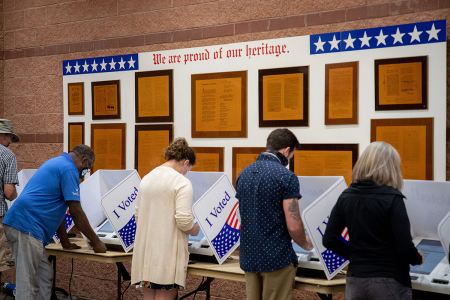Georgia Gov. Brian Kemp blasts ‘lies and misinformation’ in DOJ lawsuit over state voting law

Georgia Gov. Brian Kemp has denounced the Department of Justice’s newly filed lawsuit against the state’s election law.
Earlier this year, Kemp signed the Election Integrity Act of 2021 into law, a 98-page bill that critics claim unlawfully restricts voting rights. The law strengthens voter identification requirements for mail-in ballots while expanding early voting in most counties.
U.S. Attorney General Merrick Garland announced on Friday that the DOJ was filing suit against Georgia over the new law, echoing the claims of those opposed to the Act.
“The right of all eligible citizens to vote is the central pillar of our democracy, the right from which all other rights ultimately flow,” stated Garland.
“This lawsuit is the first step of many we are taking to ensure that all eligible voters can cast a vote; that all lawful votes are counted; and that every voter has access to accurate information.”
In response, Kemp released a statement on Friday arguing that the DOJ litigation was “born out of the lies and misinformation the Biden administration has pushed against Georgia’s Election Integrity Act from the start.”
“Joe Biden, Stacey Abrams, and their allies tried to force an unconstitutional elections power grab through Congress — and failed,” stated the governor.
“Now, they are weaponizing the U.S. Department of Justice to carry out their far-left agenda that undermines election integrity and empowers federal government overreach in our democracy.”
Kemp went on to point out that he twice fought successful legal battles against the Obama administration over state election regulations, adding, “I look forward to going three for three to ensure it’s easy to vote and hard to cheat in Georgia.”
Also known as Senate Bill 202, Kemp signed the law in March, with supporters saying the law was necessary to curb voter fraud and update regulations in light of the 2020 election.
“The stress of the 2020 elections, with a dramatic increase in absentee-by-mail ballots and pandemic restrictions, demonstrated where there were opportunities to update existing processes to reduce the burden on election officials and boost voter confidence,” reads the legislation in part.
“The changes made in this legislation in 2021 are designed to address the lack of elector confidence in the election system on all sides of the political spectrum, to reduce the burden on election officials, and to streamline the process of conducting elections in Georgia by promoting uniformity in voting.”
Changes made to state law through the Act included reducing the time available for absentee voting, requiring residents to request an absentee ballot up to 78 days before an election instead of 180 days. It also mandates a stricter photo ID requirement, allowing for early voting on weekends from 7 a.m. to 7 p.m., or 9 a.m. to 5 p.m, as well as a shorter runoff election period. The law also prohibits anyone other than poll workers from providing food or drink to a voter who is standing in line.
Although the new regulations are comparable to election laws in many other states, the Act has garnered immense negative backlash from progressive groups and others.
In April, Major League Baseball announced that it was moving their All-Star Game from the originally scheduled venue in Atlanta in response to outrage over the Act.
Additionally, groups including the New Georgia Project and Black Voters Matter have filed their own lawsuits against the law, claiming it is unconstitutional and violates the Voting Rights Act.






















